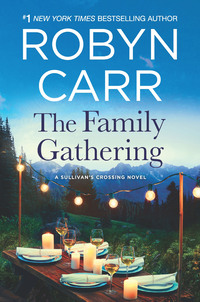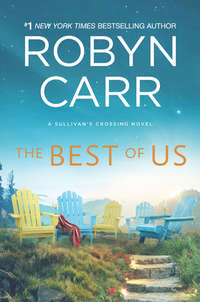
Полная версия
The Summer That Made Us
“We’ve been fighting too much. Just about that M word. I think you have a deep psychological fuckup that makes you scared of it and you should seek help.”
She laughed in spite of herself. “You’re probably right. Add that to all my deep psychological fuckups. But I’m going to see you before too long. I’m really no good without you. You’re my rock. I love you.”
He let out his breath. “That was nice to hear,” he said. “I love you, too.”
What is wrong with me? she asked herself. Why not just agree to marry him, go to England with him, settle in as a wife, adjust to that new title? It wasn’t as though she’d give him up at the point of a gun. Then why not just marry him if that’s what he wanted?
Because right now she felt very vulnerable and dependent. She didn’t feel whole. Michael hadn’t exactly said, “Since you have nothing better to do, we might as well get married,” but his presentation left her feeling worthless. And who was going to feel sorry for her? She had twelve years of extremely well-compensated success. People said she should take a year off, clear out the cobwebs, rest and relax.
She felt anything but relaxed. She was stuck with time off because she was canceled and because of Megan’s illness, but it didn’t feel good. It didn’t make her feel strong the way her talk show had. She wanted to feel sturdy and confident again. Marriage after all these years wasn’t going to do that for her. Turning her into a wife instead of a television star didn’t make her feel stronger; it made her feel even more vulnerable. She wanted to feel equal again.
* * *
Charley went to the hospital to see Dr. John Crane, Megan’s husband, rather than waiting to talk to him when he got home in the evening. She wanted him to speak frankly with Megan not present. She asked him if he could arrange his schedule to look after Meg for a few days if she wasn’t available. John said it was fine; he could be there earlier in the evening and leave later in the morning. He would adjust his schedule to make dinner in the evenings, breakfast in the morning before he went to work, and he would check on her at least once during the day.
“You’re such a good team,” Charley said. “A couple of years ago when you were separated briefly, you seemed to be as much in love as ever. If you don’t mind my asking, what happened?”
“Love was never the problem,” John said. “We’ll talk about it someday. Right now I just want to get her through the next few weeks. Are you going back to California to see Michael and Eric?”
“No, actually. I’m going up to the lake house to see what needs to be done to make it habitable. Meg wants to spend the summer there.”
John’s face split into a huge grin. “So she finally found someone who would take that on. Why am I surprised that it’s you?”
“Maybe because if I was still working it wouldn’t be. Or if Eric were younger, or many variables. But I’m available and want to see Meg through this recovery. Maybe you should tell me right now—how much care should I plan on for her recovery? Could this get worse?”
“It could, but it shouldn’t right now. She doesn’t need around-the-clock nursing care. But at the moment she’s too weak and tires too easily to look after herself for any length of time. She can’t cook, do her own laundry or clean the house, but she’ll probably continue to get stronger. At least for now.”
“And then?” Charley asked.
“And then stronger still unless...” He shrugged. “Look, the reality is, it could go either way. Quite a while ago she said no more chemo, that it took too great a toll and she wanted to enjoy what time she had left. This last round, prepping her for the transplant was the hardest yet. Four years, Charley. She’s had enough.” He hung his head slightly, then raised it again. “And that’s why. That’s the separation, right there.”
“Huh?” she said, confused.
“The separation. Our disagreement was all about treatment. I bet you didn’t expect that, did you?”
“Wait,” she said. “I didn’t know you didn’t agree on the course of treatment...”
“She doesn’t want you to know, Charley. Meg didn’t want treatment. I wanted her to do anything and everything. I admit I wouldn’t have done it, either, if I was facing stage-four metastatic cancer but I wanted her to. I couldn’t let go. I wanted anything that might give her a chance and I would have taken miracles.”
“But she’s been in remission a couple of times!” Charley said.
“Only for it to come back harder and force her into more torture. She didn’t want me to make medical decisions for her if she was unable to do it herself and I’m afraid I brought that on myself. But we made our peace with it—I won’t do that to her anymore. I’ve given her my word—it’s up to her. I’ll support her. She says this is the last time, and if that’s what she wants, so be it.” He was quiet for a moment. “Because, no matter what, I love her.”
* * *
Charley had wondered why John and Megan had been arguing so much, especially when Megan was undergoing chemotherapy and radiation. Then she wondered why John was still around so much if they were supposed to be separated and talking divorce. That was two years ago. Now it all made sense—John wanted Meg to accept radical and even experimental treatment while Megan was saying, “It’s not just a waste of time. It’s also making me so sick.”
Charley knew from her research into various talk show guests that it wasn’t always the case with cancer treatment. In fact, most forms of breast cancer were easily treatable and highly survivable. Megan just got herself a rare and aggressive form. And Charley, like John, had always thought, That means you just fight harder.
But she knew how much Meg had suffered. And fought. If she wanted this to be her last battle, that was her decision. And Charley vowed to honor it.
It begged the question—did Meg want to go to the lake to rest and recover? Or to die in the last place they were a family?
* * *
As she drove to the lake house, Charley thought back to all those summers when her family made the same drive. They spent every summer at the house on Lake Waseka. A cabin or house on a lake was almost an institution in Minnesota, the Land of 10,000 Lakes. Lake property was handed down through the generations and people who didn’t have a home or cabin had a piece of property they could park a fifth wheel or Airstream on for weekends or vacations. But the Berkeys had a very nice house because Charley’s grandfather was a superior court judge. The judge started sending his wife and two daughters to the lake for the summer when his daughters, Josephine and Louise, were nine and ten years old. He’d drive up from the Twin Cities on some weekends and for two weeks in August. Lou and Jo continued the tradition of summer at the lake after they were married and had daughters of their own.
Charley, her sisters and her cousins lived for summer. They looked forward to it all year, started shopping in April and packing in the middle of May. The very day after school let out, off they went, north to Lake Waseka, a two-hour drive. Two moms and six kids packed into Louise’s car—first a station wagon and later, as the kids grew, a van. There was no law about seat belts back then—they were merely recommended. The Hempstead girls usually piled into the back on top of each other. They’d take enough luggage to get through a week or two, stacked on top of the car in a luggage rack, and on the weekend Charley’s father would bring the rest, thoughtfully packed boxes of linens, clothes, towels, toys and any other items they didn’t want to live without for three months.
It was always so meticulously planned.
The judge and Grandma Berkey stopped going to the lake house by the time there were four granddaughters, being overwhelmed by the noise and clutter of small children. And soon there were six—all little girls—and it was more than the grandparents could take, so they started renting a cabin at the lodge across the lake for their occasional weekends.
Six girls, each born one year after the other. Three for Louise, three for Jo. It seemed perfectly choreographed—Louise, the oldest sister, had Charlene and the following year Jo had Hope. Next Lou had Megan; a year later Jo gave birth to Krista. Then there was a little slip and when Krista was only a year old Jo gave birth to Beverly, who came so fast she was actually born at the lake house. Not to be outdone, Louise then had Mary Verna, who they called Bunny. And then they stopped. Six girls, sisters and cousins, in six years. Stairstep, tow-haired girls, bonded by blood and family and not just a little DNA because sisters Lou and Jo had married brothers Carl and Roy.
The Hempstead girls appeared to have charmed lives and they were happy and carefree during summer. Life back in the Twin Cities the rest of the year had its challenges, like all families. Particularly for Jo and Roy; they struggled with money and issues brought on by that struggle. But summers were different. The lake was a magic place. A haven. All of the problems they might have had through the school year drifted away. Until the summer of ’89. That summer everything changed. Charley and Megan’s little sister, Bunny, the youngest of the six girls, Louise’s baby, drowned accidentally. She was only twelve. Louise, grief-stricken and half-mad with the pain of losing a child, insisted the lake house be closed up. For good.
Charley found that at first sight the house was worn but presentable. She knew her mother paid a local family to keep an eye on the place over the years. The grass was cut and the hedges trimmed. But it was clearly in need of some attention. It was a roomy place—three bedrooms downstairs, two small rooms upstairs in the loft with dormers, two full baths and a half bath in the master. Plus, there was living space over the boathouse and the wide, deep porch was screened. The screen was torn and sagging and there wasn’t any outdoor furniture anymore.
She pried open a porch window. Meg was right; it opened easily. Upon getting inside it became obvious she hadn’t been the first one to do that. The place was heaped with trash and the beds downstairs looked used. Stained. There were, of course, no linens. But all that aside, she was wildly optimistic—the damage was all cosmetic. She would need new furniture and new appliances. The porch would have to be rescreened. Everything would need a serious scrubbing and fresh paint. There should be new toilets and maybe new tubs.
But first, she’d call an electrician to make sure the wiring was safe. And she’d have to hire someone who would clean the place out and make a trip or two to the dump.
Charley went back outside and sat on a tree stump that had been there since she was a little girl. She pulled out her phone and began making a list in the notes section. The afternoon was sunny but not warm; April in Minnesota, especially on the lake, was chilly. The lake was so calm and quiet. The gentle lapping of the waves at the shore was soothing. She closed her eyes.
Then she began to hear it—the laughter of children. Someone’s mother yelling from the porch, You better not be in the lake without an adult! She could smell hot dogs and ribs on the grill, smell the campfire, toasted marshmallows; she saw seven sunfish lying on the dock to be cleaned—the largest of the catch. Someone whistling for his dog. A happy squeal and splash. Women laughing. The horn of a speedboat and the whistles of men. The pounding of little feet across the porch, across the dock. Whispers and giggles from the screened-in porch at night; laughter from the moms inside the house. Music from the radio mingled with the laughter. Voices and shouting of a late-night party somewhere on the lake. She recalled it so vividly she could hear it—the sounds of summer.
Maybe Meg was right. Maybe summer at the lake would bring her comfort. It could heal her, Charley thought hopefully. Or give her peace in her last days?
When Meg was going into the hospital for the bone marrow transplant she had said, “This may not work, Charley. But there’s one thing I need you to know. It’s important that you know. I’m not afraid. Either way, I’m not afraid.”
That’s when Charley decided. Whatever Megan wanted, if it was within her power, she’d make sure she had it. And, Charley thought, it wouldn’t hurt me to make peace with the past.
Chapter Two
Megan was thrilled to get a call from Charley right away. “Good news, Meg. The house needs work but it looks like it’s all cosmetic. It’s a wreck—people have definitely broken in and used the place. It’s trashed. And of course the furniture is dirty and rotting—but I can buy furniture and appliances in a flash. I’m going to get an electrician out here to check the wiring first. Also someone to haul trash. Those two things have to be done right away before I come back to the city.”
“Oh, Charley! We’ll repay you every dime!”
“That’s the least of my worries,” she said. Charley had been a minor star and had earned good money and invested wisely. She gulped back the fear that her earning days were over.
“Is it going to be a huge job?” Meg asked.
“Nope. Soap and water, paint, new furniture and appliances, new screening.”
“I wish I could help,” Megan said.
“I’m not going to do it myself,” Charley said with a laugh. “I’m going to hire people.”
“When will it be done? Will it be done soon?”
“It’ll be done by June,” she said. “It’ll probably be done before June but it’s really too cold to stay here right now. We need to wait for summer, Meg. The weather has to be warmer, especially for you. I’ll know more after I talk to a few people. I’ll be home in a few days.”
“Where are you staying?”
“There’s a motel just outside Waseka.”
“Did you look at the lodge?”
“Uh, no. For some strange reason I don’t feel like going to the lodge.”
“I promise you won’t see a familiar face, Charley!” Meg said.
“Just the same,” Charley said. “So, I don’t want you doing anything strenuous, but if you’re feeling good, you might start making a couple of lists. I haven’t looked through the cupboards yet but I’m sure most of the kitchenware is just too old and filthy to work for us. And there are no linens here. None. It looks like most of the pieces of wooden furniture are salvageable after some cleaning and polishing, but the armchairs, sofas and mattresses are out of here.”
“Okay!” Meg said. “I’ll do that! I’ll make lists!”
“Don’t get yourself too excited,” Charley cautioned. “You’re supposed to be resting and meditating and growing healthy cells.”
“I will!” she said. “I am! OMG, this is happening!”
“Oh, brother,” Charley said. “I hope this wasn’t a mistake...”
“It’s not! It’s happiness! Haven’t you heard that joy is good for illness? Joy and laughter and lake houses.”
“Take a nap,” Charley said, signing off.
Meg immediately started making lists and it filled her with optimism. That had to mean something good, she thought. She’d listed about twenty items when she stopped and instead went to the desk in the den and got out her stationery. She wanted to write to a lot of people who would probably either ignore her note or laugh and throw it away, but she was hell-bent.
Dear Hope,
In June we’re opening the lake house. Charley is doing most of the work and we’re going to spend the summer there. As you know, I’ve been somewhat under the weather.
She stopped long enough to laugh. But she thought it would be impolite to write, “As you know, I’m probably dying...”
She pressed on.
I’ve finished my chemo and bone marrow transplant and the only thing to do now is rest, relax, eat healthy food and heal. The lake is the perfect place to do that. We’d love it if you could join us. Just let me know the dates if you’re coming.
Just like old times,
Megan
She sent notes to Hope, Krista and Beverly even though Hope lived in Pennsylvania and hadn’t been back to Minnesota in at least five years and the only person Hope really kept in touch with was Grandma Berkey and occasionally Charley. Hope was a snob and loved having a famous cousin. Krista, unfortunately, was in a women’s prison, and the last time Megan heard from her, there was no parole in sight. And Beverly left the family for foster care the year after Bunny drowned. She went to live with a family better equipped to take care of her in the years following her trauma. Bunny had been Beverly’s best friend and they’d been together in that little rowboat when the storm rose up suddenly and Bunny was lost. Her foster family became her family of choice, though she did stay in touch with her mother, Jo. And Megan got Christmas cards with little notes. But the idea of Beverly going to the lake? After what had happened there? It was at best a very slim possibility.
Since it wasn’t likely any of them would come, Megan decided to reach out to Aunt Jo and Grandma Berkey. Aunt Jo would never go to the lake without an invitation from Louise and no one knew why or how Louise had that kind of power over her sister. They hadn’t been close since Bunny died. And Grandma Berkey was in a nursing home—someone would have to fetch her. With a little guilt and a sigh of resignation Megan thought that Charley would do that if she wanted it badly enough. Or John would. At the moment Meg had some very persuasive powers.
The only one she didn’t send a note to was her mother. She hadn’t even told Louise what they were doing. She’d deal with that later. But she did put stamps on her notes and took them out to the mailbox for the postman to pick up.
She told John what she’d done. “But I don’t think I’ll tell Charley,” she said.
“I can take a leave this summer,” John said. “I want us to be together.”
“Come on the weekends,” she said. “Let me stay with Charley during the week. Go to work. Your patients need you, you need them and you need to live a normal life.” Then she rubbed her cheek against his. “I might not be around forever, my darling. And I want you to carry on. In fact, the only thing I will ever ask of you is that you carry on.”
She put on some classical, cell-fortifying symphony music, reclined on the sofa in the den, took deep meditative breaths and pictured Lake Waseka as she remembered it, when it was at its best. She began to see them all as children, before the last year, six little blondes with bodies like brown sugar, freckled from the sun. Dirty, with calluses on their bare feet from not wearing shoes all summer, flushed and happy, gamy and healthy and strong. Giggling late into the muggy summer nights. Summer after summer. Everything that had nagged or bothered all year long disappeared as it was left behind. It was an escape from the real world. Grandma and the judge covered the expenses, from gas to groceries, so the material burdens were fewer and Lou and Jo were almost equals. This was significant because Aunt Jo worried about money all the time and it made her fretful. At the lake she was carefree. Happy. And there was almost nothing prettier than Aunt Jo when she was happy.
Their mothers became best friends again; there was laughter and what Grandma used to call shenanigans. They were fun. Young men passing in speedboats noticed them. Both Lou and Jo were attractive women. Lou was statuesque and bold and brazen while Jo was small and lovely and buxom and fragile. They were opposites who complemented each other. Lou often groused that Jo was the pretty one but it wasn’t exactly true. Lou could be pretty, too, when she was in a good mood, laughed and smiled. It was only the frown of envy and anger that made her plain.
At night they’d play cards or Scrabble and sometimes turn the radio up and dance—line dances and disco and boogie-woogie. All the little girls would dance, too. It was like having a party with your best friends every day of the summer. Then Lou and Jo would sleep together in Grandma’s big bed just like having a pajama party and whisper and laugh late into the night. There were eight bodies and five beds; when their husbands showed up on weekends they’d pile the kids on top of each other or make them take to the screened-in porch, but that big king-size bed of Grandma’s served them very well when it was just the two of them and the six kids.
Jo giggled more than Lou but Lou gave more advice than Jo. Whatever it was about their mysterious and complex relationship, it worked every summer. Lou would be her hardy self—capable and energetic and take-charge. And Aunt Jo would regress a little when around Lou, becoming her sweet, slightly incompetent self, but she would do whatever Lou suggested, which seemed to please them both tremendously. If you needed snuggling, like if you’d been stung by a bee, Aunt Jo was the one to go to. But if you wanted to try swimming across the lake, it was Lou who would coach and follow in the boat. Lou would teach the girls to dive; Jo would play dress-up with them. Between the two of them, no matter what problems they had all winter at home, every summer at the lake was a huge, raving, laughing, shining success. Before everything went so horribly wrong.
As Meg relaxed, she began to remember the time she fell apart. She lost her mind when she was fifteen. She’d been packing for the lake.
Carl, Meg’s father, stayed in the city to work and came to the lake on weekends. It was okay to ask him to bring something from home now and then, but he hated to be asked by everyone, all the time, week after week. He had a wife and three daughters, after all, and sometimes their requests for things that had to be searched out of closets and drawers frustrated him, made him cranky and not very helpful. So they tried to pack everything they needed for the summer. Meg tried hardest of all.
She could hear Charley and Mother fighting downstairs in the kitchen. As usual. Their voices would rise to screaming now and then; every year older Charley got, the more she swore at Mother. Mother swore, too, then denied she ever used a bad word. Whenever Megan heard them fight she renewed her own vow never to put herself through that useless exercise. Did Charley really think she was going to win against Mother? Did anyone ever win an argument with Louise?
It also meant no one was helping Bunny pack. Being the baby, Bunny tended to lack focus, expecting a big sister or her doting mother to step in and finish whatever she was doing. Bunny was spoiled. She was the only one Louise never yelled at. So, when someone gave her a chore, she didn’t take it seriously. She might pack a couple of things and then get sidetracked, dressing a doll or reading a book. Megan went down the hall to help her.
Bunny’s room was gone. Oh, the room was there, but the bed, dresser, toy chest, bookcase and Mary-had-a-little-lamb lamps were gone. Instead, Mother’s sewing machine was set up there. Also an ironing board, a trestle table covered with fabric and patterns, a sewing chest, a model-form and rocking chair. Megan felt disoriented. This was all wrong. She put a hand to her temple, feeling dizzy.
She walked around the upstairs hallway, stupidly looking for the missing room. All four bedrooms were accounted for—her parents’, hers, Charley’s and... But Bunny had no room.
“You’d better watch who you’re talking to, young lady,” Mother was shouting.
“Yeah? So what are you going to do about it? Send me away, maybe? Wouldn’t that be awful?” Charley shouted back.
“Maybe if you’d mind your manners, you’d find life here could be pleasant. Not to mention plentiful!”
Meg walked into the kitchen. Charley had changed. Megan stared at her, dazed. Who was this? Her hair was long, straight and stringy, a band tied around her head. She was so skinny, like a toothpick. Her clothes were terrible—torn and patched jeans, some kind of symbol sewn onto her little butt, and you could see her bra right through the gauzy shirt that only accentuated how flat her chest was. Her bare feet were filthy and her cheeks sunken. And the rage on her face was astonishing. Megan had seen Charley mad before, but nothing like this.
Louise had also changed. She was heavier, her hair very gray, and her face was deeply lined. Her skin was especially crepey around her eyes and under her chin. She looked like she’d been awake for a year. Her down-turned mouth was grim...but then it was usually grim when she wasn’t having her way.










